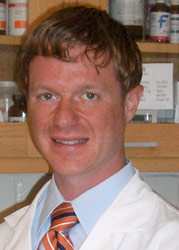Roniel Cabrera, M.D., M.S., a hepatologist and assistant professor of medicine, has won a $375,000 New Investigator Research Grant from the Bankhead-Coley Cancer Research Program grant and the Florida Department of Health in support of his research on primary liver cancer. The work involves characterizing immune-related pathways that promote development and progression of liver cancer in order to develop new targeted liver cancer therapies.
Philipp Dahm, M.D., M.H.Sc., an associate professor and director of clinical research for the department of urology and the North Florida/South Georgia Veterans Health System, is one of the recipients of the 2009 Dennis W. Jahnigen Career Development Scholars Award for his proposal “Evidence-based Decision-Making in Geriatric Genitourinary Oncology.” Dahm will work under the mentorship of Johannes Vieweg, M.D., and Rebecca J. Beyth, M.D., to investigate the high-quality evidence that guides clinical decision-making in genitourinary oncology and determine its applicability to the older patient.
Stephen Fernando, Ph.D., who recently completed his doctoral studies in the department of pharmacology and therapeutics, was awarded a merit-based travel grant by the American Society of Gene Therapy to attend the society’s annual meeting in May in San Diego. Fernando presented his research on a new gene therapy method to disrupt cancer growth using a synthetic protein that targets tumor blood vessels, inducing thrombosis that cuts off a tumor’s blood and nutrient supply.
Frank Orlando, M.D., a surgical resident, recently was honored for his research on the presence of epigenetically modified genes in breast cancer tumors. Orlando received second place at the 13th Annual Multidisciplinary Symposium on Breast Disease held in February. His research presentation highlighted the new discovery of a specific epigenetically modified gene, FOXJ1, in breast cancer and its future potential for helping to diagnose breast cancer cells more decisively and earlier.




